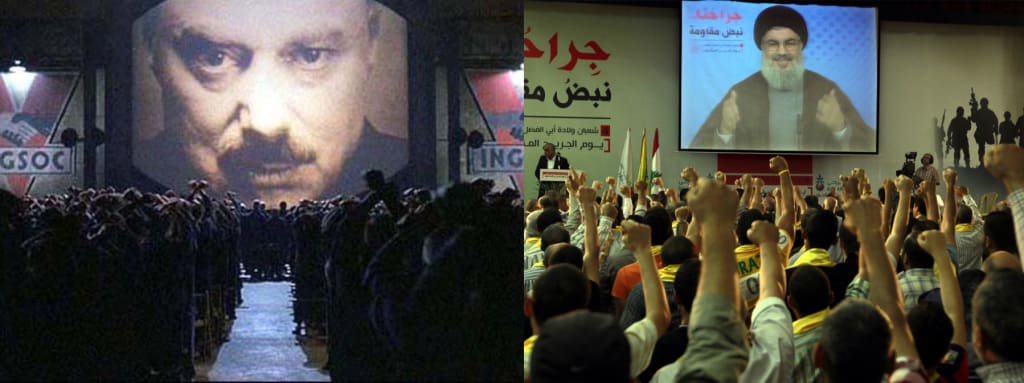Hezbollah: A Real-Life 1984
Published Originally in 2013

I wrote this piece on my blog on November 27, 2013. I felt it needs to be reshared today in light of what's happening in Lebanon.
When I was in AUB, I took a special topic CVSP course, and one of the themes we tackled was George Orwell’s 1984. The segment on Orwell included watching the movie based on the classic novel, 1984. The striking resemblance between Hezbollah today, and what Orwell imagined would be the perfect totalitarian dystopia (I realize perfect and dystopia is an oxymoron, but I’m sure you get what I mean).
The Party barrages its subjects with psychological stimuli designed to overwhelm the mind’s capacity for independent thought. The giant telescreen in every citizen’s room blasts a constant stream of propaganda designed to make the failures and shortcomings of the Party appear to be triumphant successes.
This sounds eerily familiar. Hezbollah’s relentless and convincing propaganda machine is arguably the best in Lebanon and the region. Its ability to turn mediocre, or even negative events, into “divine triumphs” and “God’s promise realized” and the shaming of those who disagree, might convince even the most liberal skeptic that it’s true. Not allowing Israel’s Defense Forces to complete their entire objectives is one thing, and the loss of over a 1000 civilian lives and the near-complete destruction of Lebanon’s infrastructure and economic abilities, is another. Yet, even Hezbollah’s staunchest rivals dare not comment on that, which is a textbook case of successful propaganda.
The Party also forces individuals to suppress their sexual desires, treating sex as merely a procreative duty whose end is the creation of new Party members. The Party then channels people’s pent-up frustration and emotion into intense, ferocious displays of hatred against the Party’s political enemies. Many of these enemies have been invented by the Party expressly for this purpose.
Hezbollah might not be that absurd, but the party’s ultra conservative ideals, their recent upping of the ante against Lebanon’s “decadent nightlife culture” and their condoning if not support for cracking down on alcohol shops in regions where they’re a majority, is definitely non-conducive to a pro-sex culture.
It’s the second part of that note though, that is more similar to the reality. The ferocious displays of hatred against the perceived enemy might not be against an invented enemy. However, the knee-jerk over-the-top reaction to almost anything, blaming it on the “zionist conspiracy” seconds after it happens, encourages these exercises in hatred, and transplants blame from fellow Lebanese, Arabs or the party itself’s shortcomings or mistakes.
Bomb goes off? It’s Israel. No discussion of where and how security or lax, no questions asked about the possibility it might be Hezbollah’s Syrian allies, back to their old Machiavellian games of “divide and conquer” (Tripoli bomb vs Dahieh bombs)
By controlling the present, the Party is able to manipulate the past. And in controlling the past, the Party can justify all of its actions in the present.
This is especially true when it comes to Hezbollah’s 1980s days. Talk of radicalization of Lebanon, and more recently, the romanticization of suicide bombings by Hezbollah’s secretary general, is often brushed off by the party, and doesn’t faze its supporters. One might comment the Iranian embassy bombings are eerily similar to the US embassy bombings (both done by radical groups against their perceived foreign enemy), but one is heralded as a historical victory, another is condemned as filthy.
In any case, the face of Big Brother symbolizes the Party in its public manifestation; he is a reassurance to most people (the warmth of his name suggests his ability to protect), but he is also an open threat (one cannot escape his gaze)
The secretary general of Hezbollah’s photos are everywhere. To many, he is a benevolent leader who can do no wrong, never lies and always sticks to his promises. To others, he is a threat that is blamed for everything. Here, the two parties are at fault. Blaming everything on Hezbollah by its opponents, is pathetic, and shows a trend of putting their paws up and justifying their every failure and shortcoming on Hezbollah’s arm, is another version of just blaming Israel for everything, and never really doing anything to help the people, their rights, freedoms and prosperity.
WAR IS PEACE, FREEDOM IS SLAVERY, and IGNORANCE IS STRENGTH
The contradictions here are painful, but they do portray the reality accurately. The warrior culture of Hezbollah, and the willingness of its loyalists to present themselves and their loved ones as “fida el Sayyed” (for the Sayyed) glorifies war and gives the impression perpetual war is the only way to have peace.
Freedom is slavery manifests itself by the willingness to compromise when it comes to freedom and rights, for the sake of the heralded cause. It’s ok if you give up many if not all of your rights, because it’s for the sake of fighting the enemy. This is a rhetoric adopted by many police states in the region as well to oppress their people with the excuse of resisting Israel (which they never really do, it’s just their excuse).
Ignorance is strength is played out when glaring facts and disadvantages get warped into something else. Fighting in Syria is a bad decision in every respect, yet, loyalty remains unflinching to it, and despite the heavy losses incurred (more fighters have died on Syrian soil than Occupied Palestinian ones) and the intense displeasure of Hezbollah’s closest allies inside Lebanon.
Yet, the justifications are many, and perhaps if the same supporters would have been consulted 3 years ago on the matter, they’d have a completely different opinion on the matter. Yet, the propaganda has worked again, and people are on board with something that is obviously not in their best interest. Ignoring the facts in this case, is the Hezb’s strength.
ORIGINALLY PUBLISHED IN NOVEMBER 2013
About the Creator
Gino Raidy
Everything you love and hate about Beirut
Enjoyed the story? Support the Creator.
Subscribe for free to receive all their stories in your feed. You could also pledge your support or give them a one-off tip, letting them know you appreciate their work.






Comments
There are no comments for this story
Be the first to respond and start the conversation.